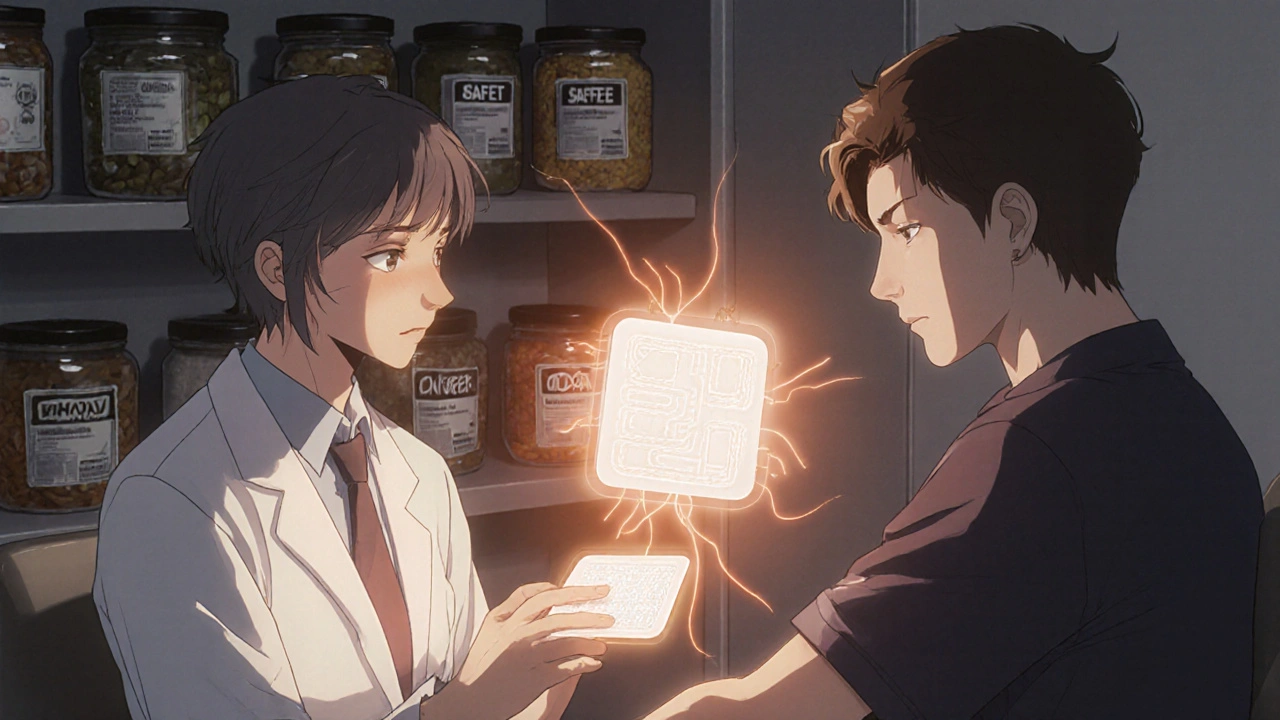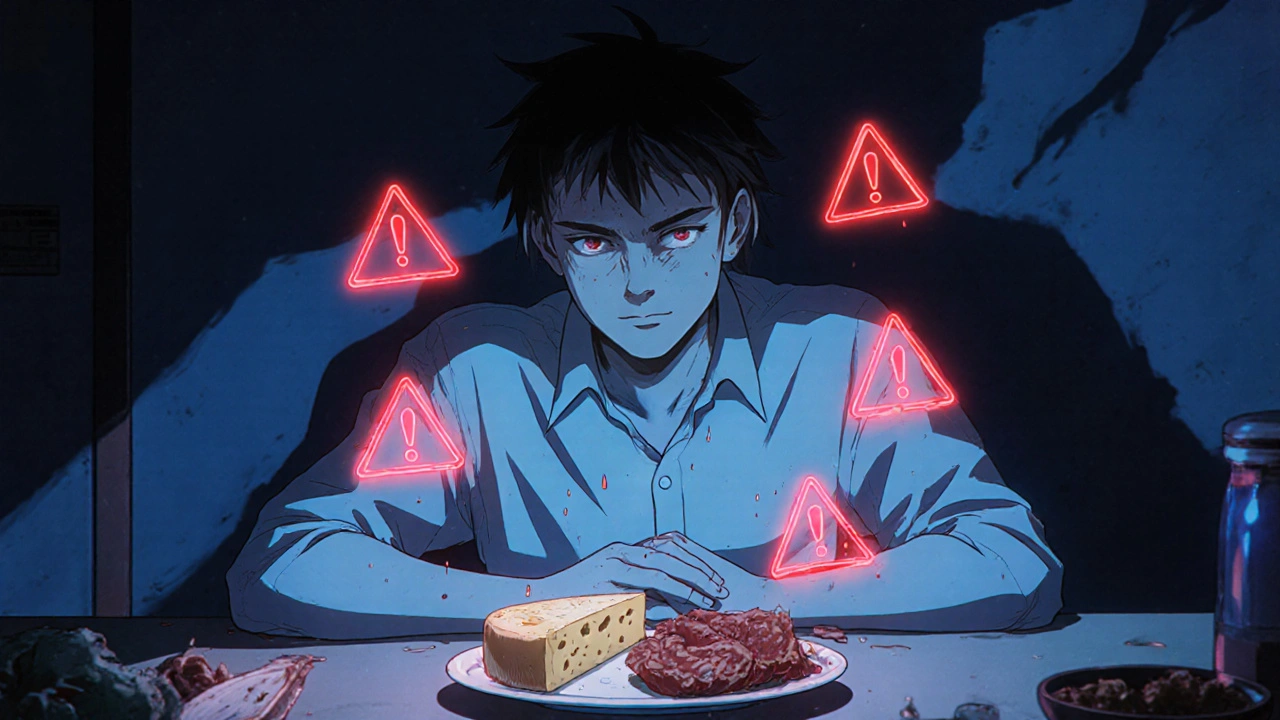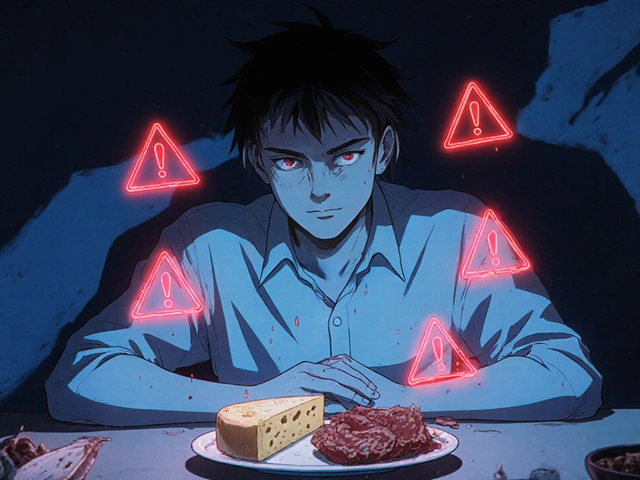MAOI Tyramine Food Checker
Check Your Food Safety
Enter any food item to see if it's safe with MAOI antidepressants. Remember: aged, fermented, and overripe foods often contain dangerous tyramine levels.
When most people think of antidepressants, they picture SSRIs like Prozac or Zoloft-easy to take, few dietary rules, and mostly mild side effects. But there’s another class of antidepressants that works differently, works better for some, and comes with serious, life-altering rules: Monoamine Oxidase Inhibitors, or MAOIs.
These drugs aren’t new. They were the first antidepressants ever developed in the 1950s. Back then, doctors didn’t know how they worked-just that they helped people who were deeply depressed. Today, we understand the science: MAOIs block an enzyme called monoamine oxidase, which normally breaks down serotonin, norepinephrine, and dopamine. By stopping that breakdown, these neurotransmitters build up in the brain, lifting mood. But here’s the catch: that same mechanism can turn deadly if you eat the wrong food or take the wrong medicine.
Why MAOIs Are Still Used Today
If MAOIs are so risky, why do doctors still prescribe them? Because for some people, nothing else works.
Studies show that about half of patients with treatment-resistant depression-those who’ve tried four or more other antidepressants without success-see real improvement on MAOIs. That’s higher than any other class of antidepressant. They’re especially effective for atypical depression: when someone feels exhausted, sleeps too much, gains weight, and reacts intensely to rejection or stress.
One patient, who’d been on six different SSRIs over 10 years, told me: “I was numb. I couldn’t cry, couldn’t laugh. Then I started Parnate. Two weeks in, I cried during a commercial. That’s when I knew something had changed.”
MAOIs aren’t first-line drugs for a reason. But for people who’ve hit a wall with every other option, they’re often the only path forward.
The Tyramine Danger: What You Can’t Eat
The biggest risk with MAOIs isn’t drowsiness or weight gain. It’s a sudden, terrifying spike in blood pressure-called a hypertensive crisis-that can lead to stroke or heart attack.
This happens because of tyramine, a compound found in aged, fermented, or spoiled foods. Normally, your gut breaks down tyramine using the same enzyme MAOIs block. But when MAO-A is turned off, tyramine floods into your bloodstream. It forces your body to release stored norepinephrine, sending blood pressure skyrocketing-sometimes above 200 mmHg.
Here’s what you must avoid:
- Aged cheeses: cheddar, blue, parmesan, brie, camembert (fresh mozzarella and cottage cheese are okay)
- Cured or smoked meats: salami, pepperoni, pastrami, hot dogs
- Fermented soy: soy sauce, miso, tempeh, tofu that’s been stored over 48 hours
- Tap beer, homebrewed beer, and some wines (especially Chianti and sherry)
- Overripe bananas, avocados, or figs
- Yeast extracts: Marmite, Vegemite, bouillon cubes
- Leftovers stored more than 24 hours
You don’t need to become a nutritionist, but you do need to read labels. A 2023 study found that 28% of MAOI users had at least one hypertensive episode in their first year-most from eating something they thought was “safe.”
The transdermal patch (Emsam) at the lowest dose (6 mg/24hr) doesn’t require dietary changes. But once you go above that, the rules kick in. Most people on oral MAOIs (like phenelzine or tranylcypromine) follow strict diets for life.
Deadly Drug Interactions
MAOIs don’t just clash with food-they clash with common medicines.
Take a cold pill. Many contain pseudoephedrine or dextromethorphan. Even a single 30 mg dose can trigger a hypertensive crisis. Over-the-counter cough syrups, decongestants, and even some herbal supplements like St. John’s Wort can be dangerous.
The biggest danger comes from mixing MAOIs with SSRIs or SNRIs. If you switch from an SSRI to an MAOI without waiting long enough, you risk serotonin syndrome: a life-threatening surge of serotonin that causes fever, confusion, rapid heartbeat, muscle rigidity, and seizures. The window? At least two weeks. For fluoxetine (Prozac), you need five weeks because it lingers in your system.
Doctors now use a “washout period” checklist before switching meds. But patients often don’t know how long to wait. A 2022 study found that 15% of serotonin syndrome cases linked to MAOIs happened because patients didn’t understand the waiting period.

Side Effects You Won’t Find on Brochures
Yes, MAOIs cause dizziness, dry mouth, and weight gain. But the hidden side effects are worse.
Many users report “tyramine anxiety”-a constant, low-grade fear that they’ve eaten something dangerous. One Reddit user wrote: “I check expiration dates like they’re nuclear codes. I won’t eat at a friend’s house unless I’ve cooked with them first.”
Sexual side effects are common too. Low libido, delayed orgasm, or inability to climax affect nearly 60% of users. Unlike SSRIs, where these issues are often reversible, MAOI-related sexual dysfunction can persist even after stopping the drug.
And then there’s the social cost. Dating becomes complicated. Explaining why you can’t have soy sauce on sushi or cheese on pizza isn’t easy. One woman said: “I broke up with my boyfriend because he kept bringing me wine. I didn’t want to be the girl who says no to everything.”
Who Should Avoid MAOIs?
MAOIs aren’t for everyone. Avoid them if you:
- Have uncontrolled high blood pressure
- Have liver disease
- Are pregnant or breastfeeding
- Have a history of stroke or heart attack
- Are under 18 or over 65 without close monitoring
- Can’t commit to lifelong dietary changes
Even if you’re a good candidate, you need a psychiatrist who knows how to manage MAOIs-not just a general doctor. The American Psychiatric Association recommends MAOIs only after other options fail, and only with ongoing education and follow-up.

Is There a Better Way?
Yes-and it’s already here.
The Emsam patch (selegiline) is a game-changer. At the lowest dose (6 mg/24hr), you don’t need to change your diet. At higher doses, you do-but the risk is still lower than with oral MAOIs. It’s expensive ($850-$1,200/month), but for many, it’s worth it.
There’s also new research. A 2023 study in Nature Mental Health tested a new MAO-A inhibitor that reduced tyramine sensitivity by 70%. If it works in humans, we could see safer MAOIs in the next five years.
For now, though, MAOIs remain a tool for the toughest cases. They’re not a quick fix. They’re not convenient. But for some, they’re the only thing that brings them back to life.
What to Do If You’re Considering MAOIs
If you’re thinking about MAOIs, here’s your action plan:
- Get a full psychiatric evaluation. Make sure you’ve truly tried other antidepressants first.
- Ask for a referral to a psychiatrist who specializes in treatment-resistant depression.
- Request a session with a dietitian trained in MAOI safety.
- Get a list of safe foods and emergency meds (like phentolamine) in case of crisis.
- Set up weekly check-ins for the first 3 months.
- Join a support group. The MAOI Information Project has over 5,000 members sharing tips, recipes, and stories.
MAOIs aren’t for the faint of heart. But for those who’ve lost hope, they can be a lifeline.
Can you drink alcohol on MAOIs?
No. Alcohol, especially red wine, tap beer, and liqueurs, can trigger dangerous blood pressure spikes. Even small amounts are risky. Some people report mild reactions like headaches or flushing after just one drink. It’s safest to avoid alcohol completely while on MAOIs.
How long do you have to stay on MAOIs?
Most people stay on them for at least 6-12 months to see if the benefits last. If they work, many stay on for years. Some patients have been on MAOIs for over a decade. Stopping suddenly can cause withdrawal symptoms like anxiety, nausea, and insomnia. Always taper under medical supervision.
Are MAOIs addictive?
No. MAOIs don’t cause euphoria or cravings like opioids or benzodiazepines. They’re not addictive. But because they change brain chemistry, stopping abruptly can cause withdrawal. This isn’t addiction-it’s physiological adaptation. Always work with your doctor to taper off safely.
Can you take MAOIs with anxiety meds?
Some are safe, but most aren’t. Benzodiazepines like lorazepam or clonazepam are usually okay. But avoid any anxiety meds that contain dextromethorphan, buspirone, or trazodone. Always check with your psychiatrist before combining any new medication with MAOIs.
What happens if you accidentally eat tyramine?
Symptoms include severe headache, chest pain, rapid heartbeat, sweating, blurred vision, or nausea. If you feel any of these, sit down, stay calm, and call emergency services. If you’ve been given phentolamine (an emergency blood pressure reducer), take it as directed. Don’t wait. A hypertensive crisis can turn fatal in minutes.
Why are MAOIs so rarely prescribed?
Because they’re hard to manage. Doctors don’t get trained on them in medical school. Patients find the diet overwhelming. Insurance often doesn’t cover the patch. And the fear of a fatal reaction-even though it’s rare-makes many hesitant. But for treatment-resistant depression, they’re one of the most effective tools we have.



Man, I wish someone told me this before I tried MAOIs. My cousin was on Parnate and went full ninja with his diet-no cheese, no beer, no leftovers. He said the first time he cried during a commercial was like waking up from a coma. No joke, this post saved me from trying SSRIs again. Thanks for laying it out like this.
THIS. I’ve been on Emsam for 3 years and honestly? It’s the only thing that didn’t make me feel like a zombie. I still eat sushi, I just skip the soy sauce. And yes, I check expiration dates like I’m defusing a bomb 😅 But I’m alive, I laugh again, and I don’t hate Mondays. Worth every weird rule.
How quaint. You’re all treating MAOIs like some kind of mystical elixir. The truth is, this is just pharmacological brute force-slamming neurotransmitters into overdrive while ignoring the body’s natural regulatory systems. You call it ‘bringing someone back to life’-I call it chemical coercion with a side of dietary fascism. And don’t get me started on how the pharmaceutical industry profits from keeping people dependent on these archaic, high-risk regimens. The fact that you’re celebrating this as ‘hope’ is frankly alarming.
You’re all ignoring the real issue: the social isolation. I’ve had three relationships fail because I couldn’t eat at restaurants. My mom still doesn’t understand why I won’t try her homemade bolognese. It’s not the diet. It’s the loneliness.
OMG I JUST ATE BLUE CHEESE AND I’M ON PARNATE 😱 I’M DYING I CAN FEEL IT MY HEART IS RACING I NEED HELP 😭😭😭
they said the patch was safe but i think the fda is hiding something... why do they make you go above 6mg if it's safe at 6? they want you to get sick so they can sell you more drugs. i checked the ingredients in emsam... it's got titanium dioxide. that's in paint. they're poisoning us. i'm not eating anything that's been near a fridge since i started. even tap water might have tyramine. i think the government is behind this.
While the clinical utility of MAOIs in treatment-resistant depression is statistically significant (Cohen’s d = 0.82, p < .001 in meta-analyses), the risk-benefit calculus remains deeply problematic. The tyramine-induced noradrenergic surge constitutes a Class I pharmacodynamic interaction, with an estimated incidence of 0.1–0.3% per patient-year. The Emsam transdermal system mitigates this via selective MAO-A inhibition in the gut, but systemic absorption at higher doses reintroduces the hazard. Furthermore, the persistence of sexual dysfunction post-discontinuation suggests irreversible neuroadaptation. A neurochemical intervention of this magnitude demands longitudinal biomonitoring-something rarely implemented in primary care.
I’m not even gonna lie. I took a bite of pepperoni pizza after 8 months on MAOIs and I swear I felt my soul leave my body. I had to call 911. I’m still in therapy for the trauma. And now I’m scared to even look at a banana. I think the world is trying to kill me. I don’t trust anyone anymore. Not even my dog. He looked at me funny last night. I think he knows.
People in the U.S. act like this is some revolutionary breakthrough. In Ireland, we’ve known for decades that antidepressants are just a Band-Aid on a broken society. We don’t need more chemicals-we need better housing, real mental health services, and an end to the capitalist grind that’s turning everyone into a numb husk. You’re all just drinking the Big Pharma Kool-Aid while the system keeps crushing you. This isn’t hope. It’s surrender dressed up as science.